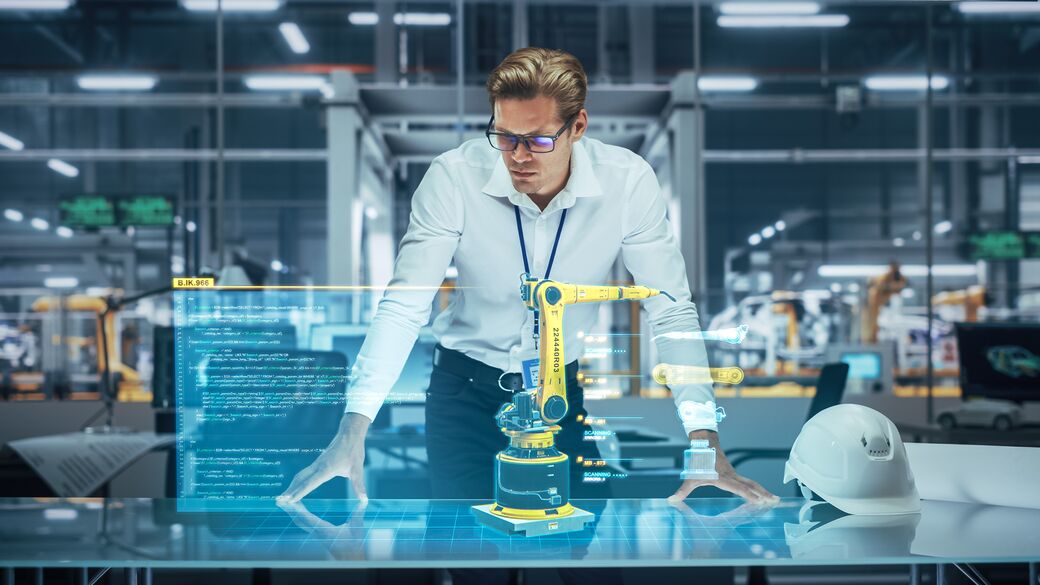
The path of artificial intelligence (AI) in manufacturing points toward a future of deeper integration and synergy among team members’ expertise and AI capabilities. While AI can crunch numbers and analyze data at scale, it lacks the nuanced understanding and intuition that humans possess. This is where the synergy between human expertise and AI capabilities becomes paramount. Collaborative robots, known as "cobots," will play a pivotal role in human-machine collaboration on the factory floor, improving productivity and safety.
AI-powered supply chain management will continue to evolve, leveraging predictive, interpretive, and generative analytics to anticipate demand fluctuations, mitigate risks, and optimize supply chains across global networks. This proactive approach will ensure supply chain resilience in the face of disruptions such as natural disasters or any other unexpected event.
At the heart of this transformation are AI-driven digital twins. These digital replicas of physical assets or processes serve as virtual counterparts, providing manufacturers with real-time insights and predictive capabilities. Furthermore, digital twins enable manufacturers to simulate "what-if" scenarios. They can test new production strategies, evaluate the impact of design changes, and optimize resource allocation—all without disrupting actual operations. This ability to experiment in a risk-free virtual environment empowers manufacturers to make data-backed decisions with confidence. This isn't science fiction; it's the future of Industry 4.0.
Digital twins go beyond mere data visualization; they harness the power of AI to analyze complex datasets and detect anomalies. For manufacturers, this means unprecedented visibility into their operations. They can predict equipment failures before they occur, optimize maintenance schedules, and ensure maximum uptime. This proactive approach not only reduces downtime but also minimizes costly repairs and improves overall productivity.
AI can provide immense value in autonomous software in supply chain S&OP processes and supply chain design. This application can support modern, intuitive S&OP processes through a natural language (NL) interface and enable transparent supply chain network design iterations. The business impact is more sophisticated solutions to automate and optimize processes, allowing people to focus on value-added tasks. Instead of replacing human workers, AI acts as a collaborative partner, empowering employees to make informed decisions and take corrective actions swiftly. This human-AI partnership fosters a culture of continuous improvement, where every decision is backed by data-driven intelligence.
Moreover, AI-powered ERP systems play a pivotal role in orchestrating this synergy. By integrating AI capabilities directly into ERP platforms, manufacturers can streamline data management, automate routine tasks, and enable seamless communication across departments. This integration ensures that decision-makers have access to timely, accurate information, enabling agile responses to changing market dynamics. Furthermore, AI-powered ERP systems facilitate adaptive planning and agile execution. They can dynamically adjust production schedules based on demand forecasts, market trends, and resource availability. This agility is crucial in today's fast-paced business environment, where the ability to respond quickly to market shifts can make the difference between success and failure. With over two decades of experience in analyzing industry trends, it's evident that the trajectory of AI in manufacturing is poised to revolutionize how businesses operate. This convergence is not just about automating tasks but about reshaping entire workflows, optimizing processes, and driving unparalleled efficiency.
The future of manufacturing lies at the intersection of AI and ERP. AI-driven digital twins will revolutionize how manufacturers monitor, analyze, and optimize their operations, while the integration of AI within ERP systems will enable seamless collaboration between humans and machines. As we embrace this digital transformation journey, the potential for innovation and efficiency gains in manufacturing appears limitless. The era of AI-powered manufacturing has arrived, ushering in a new era of productivity and competitiveness. The future looks bright.